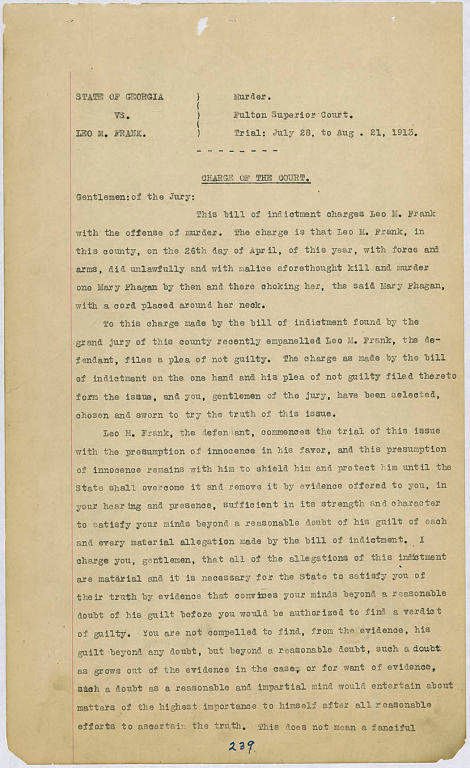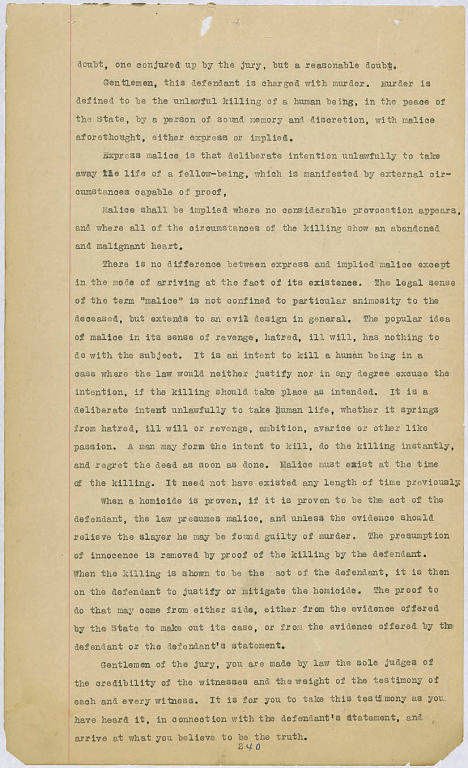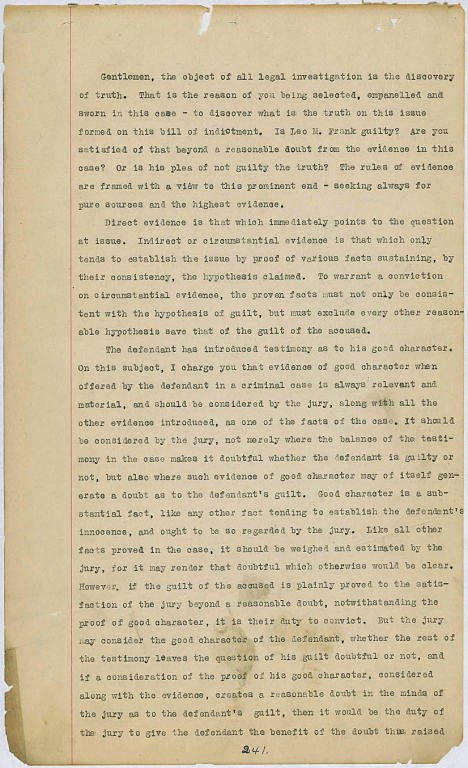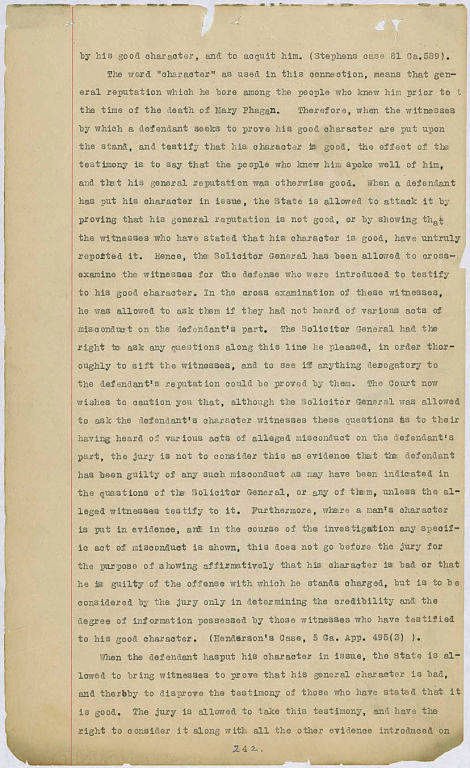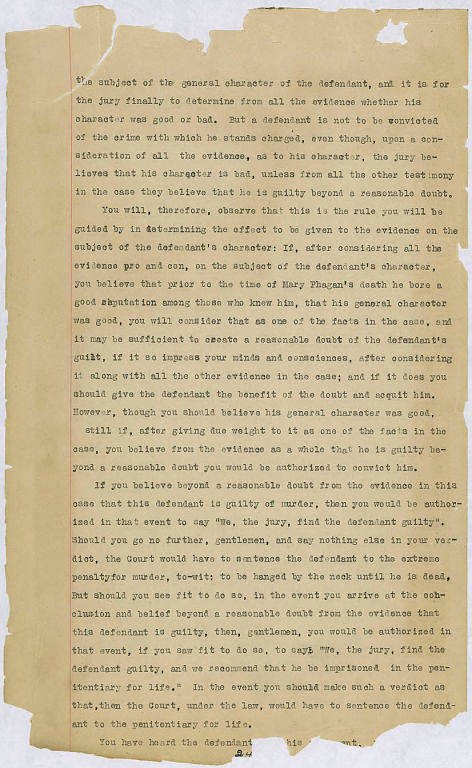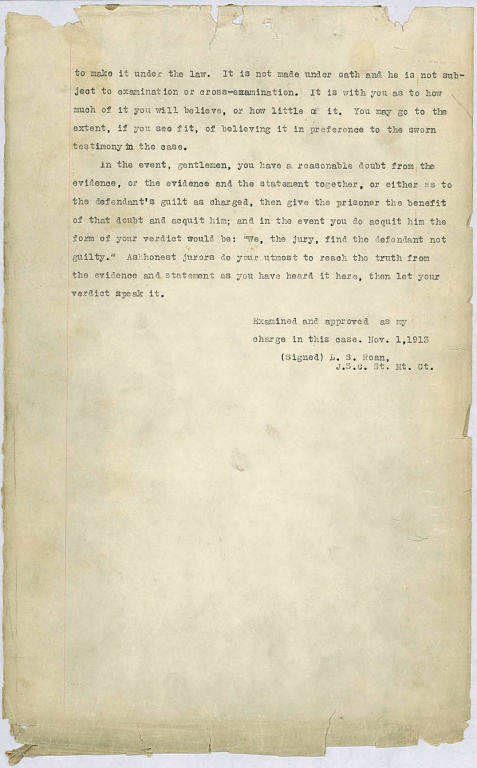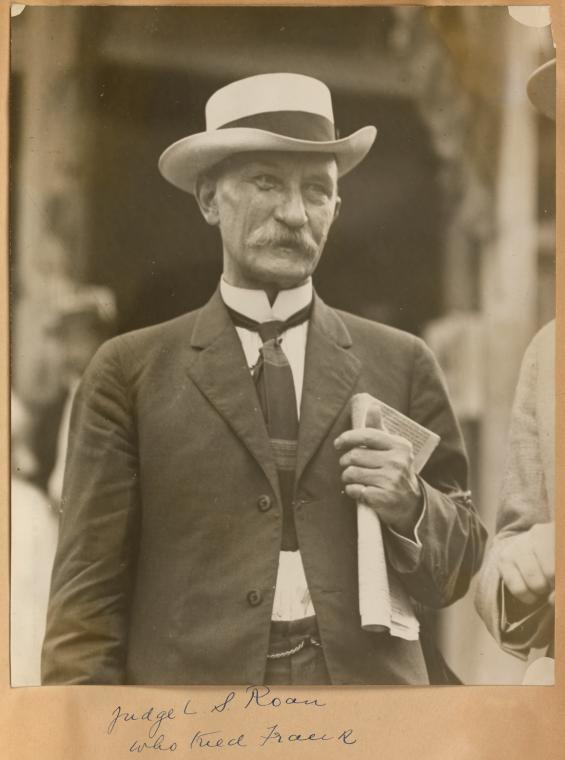
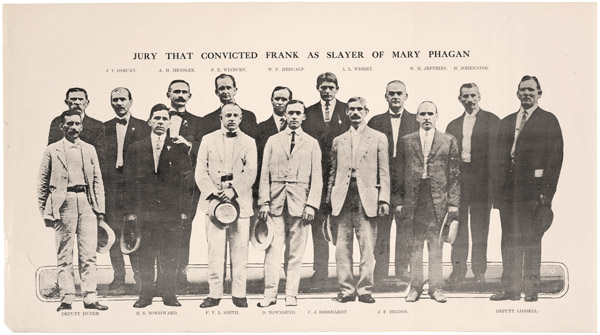
Gentlemen of the jury. This bill of indictment charges Leo M. Frank with the offense of murder. The charge is that Leo M. Frank, in this county, on the 26th day of April of this year, with force and arms, did unlawfully and with malice aforethought kill and murder one Mary Phagan by then and there choking her, the said Mary Phagan, with a cord placed around her neck.
To this charge made by the bill of indictment found by the Grand Jury of this county recently empaneled Leo M. Frank, the defendant, files a plea of not guilty. The charge as made by the bill of indictment on the one hand and his plea of not guilty filed thereto form the issue, and you, gentlemen of the jury, have been selected, chosen and sworn to try the truth of this issue.
Leo M. Frank, the defendant, commences the trial of this issue with the presumption of innocence in his favor, and this presumption of innocence remains with him to shield him and protect him until the state shall overcome it and remove it by evidence offered to you, in your hearing and presence, sufficient in its strength and character to satisfy your minds beyond a reasonable doubt of his guilt of each and every material allegation made by the bill of indictment.
I charge you, gentlemen, that all of the allegations of this indictment are material and it is necessary for the state to satisfy you of their truth by evidence that convinces your minds beyond a reasonable doubt of his guilt before you would be authorized to find a verdict of guilty.
You are not compelled to find, from the evidence, his guilt beyond any doubt, but beyond a reasonable doubt, such a doubt as grows out of the evidence in the case, or for the want of evidence, such a doubt as a reasonable and impartial man would entertain about matters of the highest importance to himself after all reasonable efforts to ascertain the truth. This does not mean a fanciful doubt, one conjured up by the jury, but a reasonable doubt.
Gentlemen, this defendant is charged with murder. Murder is defined to be the unlawful killing of a human being, in the peace of the state, by a person of sound memory and discretion, with malice aforethought either express or implied.
Express malice is that deliberate intention unlawfully to take away the life of a fellow-creature, which is manifested by external circumstances capable of proof.
Malice shall be implied where no considerable provocation appears, and where all of the circumstances of the killing show an abandoned and malignant heart.
There is no difference between express and implied malice except in the mode of arriving at the fact of its existence. The legal sense of the term “malice” is not confined to particular animosity to the deceased, but extends to an evil design in general. The popular idea of malice in its sense of revenge, hatred, ill will, has nothing to do with the subject. It is an intent to kill a human being in a case where the law would neither justify nor in any degree excuse the intention if the killing should take place as intended. It is a deliberate intent unlawfully to take human life, “whether it springs from hatred, ill will or revenge, ambition, avarice or other like passion. A man may form the intent to kill, do the killing instantly, and regret the deed as soon as done. Malice must exist at the time of the killing. It need not have existed any length of time previously.
When a homicide is proven, if it is proven to be the act of the defendant, the law presumes malice, and unless the evidence should relieve the slayer he may be found guilty of murder. The presumption of innocence is removed by proof of the killing by the defendant. When the killing is shown to be the act of the defendant, it is then on the defendant to justify or mitigate the homicide. The proof to do that may come from either side, either from the evidence offered by the state to make out its case, or from the evidence offered by the defendant or the defendant’s statement.
Gentlemen of the jury, you are made by law the sole judges of the credibility of the witnesses and the weight of the testimony of each and every witness. It is for you to take this testimony as you have heard it, in connection with the defendant’s statement, and arrive at what you believe to be the truth.
Gentlemen, the object of all legal investigation is the discovery of truth. That is the reason of you being selected, empaneled and sworn in this case — to discover what is the truth on this issue formed on this bill of indictment. Is Leo M. Frank guilty ? Are you satisfied of that beyond a reasonable doubt from the evidence in this case? Or is his plea of not guilty the truth?
The rules of evidence are framed with a view to this prominent end — seeking always for pure sources, and the highest evidence.
Direct evidence is that which immediately points to the question at issue. Indirect or circumstantial evidence is that which only tends to establish the issue by proof of various facts sustaining, by their consistency, the hypothesis claimed. To warrant a conviction on circumstantial evidence, the proven facts must not only be consistent with the hypothesis of guilt, but must exclude every other reasonable doubt hypothesis save that of the guilt of the accused.
The defendant has introduced testimony as to his good character. On this subject, I charge you that evidence of good character when offered by the defendant in a criminal case is always relevant and material, and should be considered by the jury, along with all the other evidence introduced, as one of the facts of the case.
It should be considered by the jury, not merely where the balance of the testimony in the case makes it doubtful whether the defendant is guilty or not, but also where such evidence of good character may of itself generate a doubt as to the defendant’s guilt. Good character is a substantial fact, like any other fact tending to establish the defendant’s innocence, and ought to be so regarded by the jury. Like all other facts proved in the case, it should be weighed and estimated by the jury, for it may render that doubtful which otherwise would be clear.
However, if the guilt of the accused is plainly proved to the satisfaction of the jury beyond a reasonable doubt, not withstanding the proof of good character, it is their duty to convict. But the jury may consider the good character of the defendant, whether the rest of the testimony leaves the question of his guilt doubtful or not, and if a consideration of the proof of his good character, considered along with the evidence, creates a reasonable doubt in the minds of the jury as to the defendant’s guilt, then it would be the duty of the jury to give the defendant the benefit of the doubt thus raised by his good character, and to acquit him.
The “character” as used in this connection, means that general reputation which he bore among the people who knew him prior to the time of the death of Mary Phagan. Therefore, when the witnesses by which a defendant seeks to prove his good character are put upon the stand, and testify that his character is good, the effect of the testimony is to say that the people who knew him spoke well of him, and that his general reputation was otherwise good. When a defendant has put his character in issue, the state is allowed to attack it by proving that his general reputation is not good, or by showing that the witnesses who have stated that his character is good, have untruly reported it.
Hence, the Solicitor General has been allowed to cross-examine the witnesses for the defense who were introduced to testify to his good character. In the cross-examination of these witnesses, he was allowed to ask them if they had not heard of various acts of misconduct on the defendant’s part. The Solicitor General had the right to ask any question along this line he pleased, in order thoroughly to sift the witnesses, and to see if anything derogatory to the defendant’s reputation could be proved by them.
The Court now wishes to say to you that, although the Solicitor General was allowed to ask the defendant’s character witnesses these questions as to their having heard of various acts of alleged misconduct on the defendant’s part the jury is not to consider this as evidence that the defendant has been guilty of any such misconduct as may have been indicated in the questions of the Solicitor General, or any of them, unless the alleged witnesses testify to it. Furthermore, “where a man’s character is put in evidence, and in the course of the investigation any specific act of misconduct is shown, this does not go before the jury for the purpose of showing affirmatively that his character is bad or that he is guilty of the offense with which he stands charged, but is to be considered by the jury only in determining the credibility and the degree of information possessed by those witnesses who have testified to his good character.
When the defendant has put his character in issue, the state is allowed to bring witnesses to prove that his general character is bad, and thereby to disprove the testimony of those who have stated that it is good. The jury is allowed to take this testimony, and have the right to consider it along with all the other evidence introduced on the subject of the general character of the defendant, and it is for the jury finally to determine from all the evidence whether his character was good or bad. But a defendant is not to be convicted of the crime with which he stands charged, even though, upon a consideration of all the evidence, as to his character the jury believes that his character is bad unless from all the other testimony in the case they believe that he is guilty beyond a reasonable doubt.
You will, therefore, observe that this is the rule you will be guided by in determining the effect to be given to the evidence on the subject of the defendant’s character. If, after considering all the evidence pro and con on the subject of the defendant’s character, you believe that prior to the time of Mary Phagan’s death he bore a good reputation among those who knew him, that his general character was good, you will consider that as one of the facts in the case, and it may be sufficient to create a reasonable doubt of the defendant’s guilt, if it so impress your minds and consciences, after considering it along with all the other evidence in the case; and if it does you should give the defendant the benefit of the doubt and acquit him. However, though you should believe his general character was good, still if, after giving due weight to it as one of the facts in the case, you believe from the evidence as a whole that he is guilty beyond a reasonable doubt, you would be authorized to convict him.
If you believe beyond a reasonable doubt from the evidence in this case that this defendant is guilty of murder, then you would be authorized in that event to say, “We, the jury, find the defendant guilty.” Should you go no further, gentlemen, and say nothing else in your verdict, the Court would have to sentence the defendant to the extreme penalty for murder, towit: to be hanged by the neck until he is dead. But should you see fit to do so, in the event you arrive at the conclusion and belief beyond a reasonable doubt from the evidence that this defendant is guilty, then, gentlemen, you would be authorized in that event, if you saw fit to do so, to say: “We, the jury, find the defendant guilty, and we recommend that he be imprisoned in the pentitentiary for life.” In the event you should make such a verdict as that, then the Court, under the law, would have to sentence the defendant to the penitentiary for life.
You have heard the defendant make his statement. He had the right to make it under the law. It is not made under oath and he is not subject to examination or cross-examination. It is with you as to how much of it you will believe or how little of it. You may go to the extent, if you see fit, of believing it in preference to the sworn testimony in the case.
In the event, gentlemen, you have a reasonable doubt from the evidence, or the evidence and the statement together, or either, as to the defendant’s guilt as charged, then give the prisoner the benefit of that doubt and acquit him; and in the event you do acquit him the form of your verdict would be: “We, the jury, find the defendant not guilty.” As honest jurors do your utmost to reach the truth from the evidence and statement as you have heard it here, then let your verdict speak it.

The Jury began deliberation at 1:30pm, at one point during the review a vote was taken and the result was 11 to 1. The dissenting voter told the group he didn’t want a fast conviction, but for his fellow jurymen to to spend more time discussing the case. As a result the Jury continued to deliberate, and at 4:39pm after more than 3 hours behind closed doors, the Jury came to an unanimous decision after a second and final vote. The verdict was guilty as charged, and sentencing recommendation was ‘without mercy’ implying a death sentence for Leo Frank. The verdict was delivered to Judge Leonard Stickland Roan at 4:56pm and then each Jury member was polled individually.
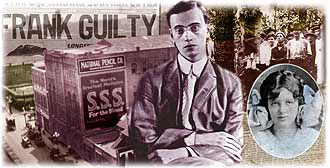
Post Conviction
The Leo M. Frank conviction is most often cited as the impetus for inspiring the founding of the Anti-Defamation League of B’nai B’rith (ADL) by Sidney Livingston in the fall month of October 1913.
References
Charge of the Court at the Leo Frank Trial, August 25, Georgia Supreme Court Case File, 1913.
Leo Frank Trial Brief of Evidence, 1913.
Appendix
